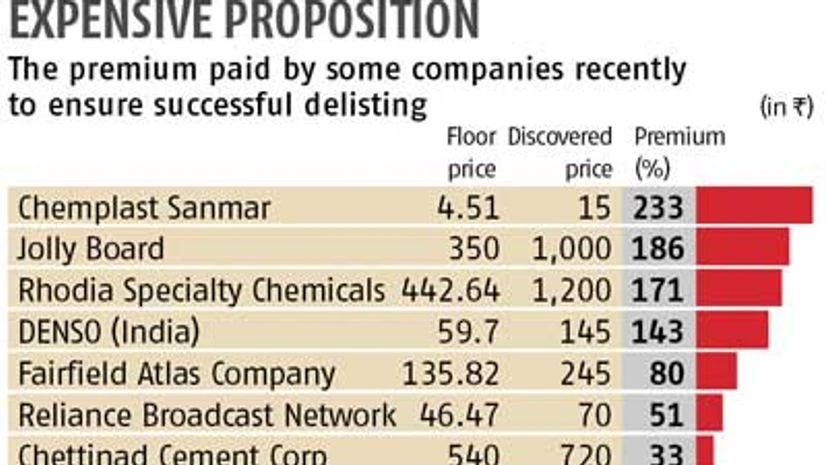It's a case of once bitten, twice shy for punters. Following Ricoh India's decision to reject the high delisting price demanded by shareholders, traders have adopted a cautious approach towards the three delistings currently underway.
Typically, the share prices of companies that decided to go private see a big spurt. This has, however, not been the case with AstraZeneca Pharma and Essar Oil, which recently said they planned to delist, signalling low investor confidence.
Share prices of both AstraZeneca and Essar Oil have remained flat since their respective announcements. That of Fulford India, which to plans to delist, have gained sharply but that has prompted the company to warn that the spurt isn't backed by fundamentals.
“Clearly, the market and the investors are not really gung-ho. It is quite possible that the delisting might not go through in the first round and the companies might have to repeat the process later,” said Kunj B Bansal, chief investment officer, equity, Centrum Wealth Management.
Analysts said traders were concerned that if the delisting process fails to go through, the stock price could fall. The shares of Ricoh India had crashed about 40 per cent after its Japanese promoters rejected the discovered price and instead decided to continue as a listed company.
Market players said this failure at delisting had dented the confidence of punters. This could, they said, lead to less aggression from them in the coming offerings. This could see a narrowing of the delisting premium, the difference between the floor price and the discovered price.
Exchange data shows the average premium in the previous 38 delisting offers was 73 per cent.
Some of the companies where promoters agreed to pay hefty premiums to ensure the delisting bid was successful include Jolly Board, HSBC InvestDirect, Atlas Copco and Chemplast Sanmar. In most of these cases, the discovered price in the reserve book building (RBB) process was at least twice that of the floor price set by these companies.
Market players said that although the share prices of AstraZeneca and Essar Oil hadn't moved much, this could change once they announced their floor price and the bidding started. “Once the floor price of the delisting is announced, the share prices will automatically gravitate towards that number. So far, since the prices have not been disclosed, investors have chosen to stay away,” said Dipen Shah, senior vice-president, Kotak Securities.
Under the RBB process, the price discovery mechanism used for delistings, the highest price at which the largest number of shareholders place their bids, becomes the offer price or discovered price. The promoter, however, is not obliged to purchase the shares at the discovered price. If the promoter decides to reject the offer price, the delisting bid fails, as was seen in the case of Ricoh India.
Typically, traders enter the counter of a company as soon as it announces plans to delist. The try to corner as many shares as possible, often also tying up with other major shareholders to influence the delisting price.
Ricoh India announced its intention to delist in November 2013. It had seen its share price nearly triple as the process was on.

)
